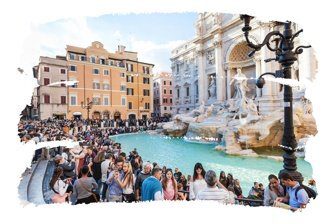The best five Chianti wineries
When we talk about Italian wines, Chianti is one of the first names that comes to mind. With a unique flavor that seduces our palate at the first sip, it is a classic wine capable of pleasing even the most demanding palates. Today we are going to get to know the best five Chianti wineries. Here at Your Travel to Italy with Ana Patricia you make the trip of your dreams !!! ALSO: see our “Accommodation in Italy – Tips for your holidays!”
Video about Chianti
(Source: Cristian TESS)
Introduction
Chianti is, without a doubt, one of the most celebrated wines in the world. The winery route between Florence and Siena is the famous Strada SS222 and it’s beautiful! If you want to learn more about the Chianti wine route, I invite you to read this post: “Chianti wine road and its best wineries” and Where to buy wines in Rome, Florence and Milan?
Today we’re going to talk exclusively about Chianti canteens and we’ll point you to 5 of them. Of course there are a multitude of wineries and one is more pleasant than the other, but it is worth remembering that not all of them are open to visitation and most of them require reservations, therefore, plan in advance, OK?!
ATTENTION:
- Under no circumstances drink and drive, OK?! If you want to do wine tasting, hire a private driver (talk to me, I have great recommendations!). The sanction for those who drive after drinking in Italy is heavy and if there’s something that works here, it’s the laws. To learn more, read our post: “Can I drink and drive in Italy?”
Note
- The term “Enogastronomic” (you can also find it written as “enogastronomy”) means “food and wine tourism”. Essentially it’s an Italian word and it’s also a “new” and not a very common word “YET”! Discover our section Food in Italy!
1) The best five Chianti wineries: CAPANNELLE
Capannelle – Capannelle is not just a canteen: it is a hotel, restaurant and a truly fantastic enogastronomic center! Modern, charming and with impeccable wines, it welcomes its visitors in a relaxed way, without leaving aside the classic elegance of the Italians. The winery began operating in 1974 and released its first wine one year later; I don’t even need to say that it was, and still is, a success, do I?
2) The five best Chianti wineries: LAMOLE
Lamole – Founded just after World War II, Lamole is one of Chianti’s best-known wineries. The cellar still maintains its oldest aging rooms immaculate: some date back to the mid-14th century, as they were part of the Castle of Lamole. The canteen also has a modern part with state-of-the-art technology and produces top quality wine. The area where the winery is located is beautiful and offers beautiful views.
3) The five best Chianti wineries: DIEVOLE
Dievole – Wine, impeccable food, olive oil and resort. Do you know what’s missing here? You! Dievole is a true paradise for wine lovers! With a spectacular structure, it offers its visitors a splendid canteen, restaurant and accommodation. Everything in great taste and in a delightful location, this is the ideal place for those who want to immerse themselves in the enogastronomic world.
4) The five best Chianti wineries: COLTIBUONO
Coltibuono – Another fantastic resort whose main attraction is its beautiful winery! The structure of the place receives tourists in a delicious way and time seems to fly once there. You can also take the opportunity to take a culinary course offered by the cafeteria. The place is amazing and offers us great options for a dream weekend. The canteen is modern, the vineyards are well cared for and the staff is passionately nice.
5) The five best Chianti wineries: CASTELLO DI AMA
Castello di Ama – Do you want to taste splendid Chianti in a castle? Then you have just found your destination! Castello di Ama is one of the best Chianti producers in the area and also features an amazing restaurant. With a breathtaking view and in a privileged location, it will offer you a unique and unforgettable enogastronomic experience!
A little bit of Chianti History…
The term Chianti first appeared in a parchment from 790, however, the first records referring to winemaking in Chianti only appear in 913 and were found in the church of St Cristina, in Lucignano. But it was not until 1023 that land in that area was granted for vineyards; the concession was made to a colonist who undertook to improve them at Grignano, near Florence, and make them productive.
In the Middle Ages, then, the vocation of Chianti arose, which follows the line of teachings of the monks. Moving on to the 12th century, there are the families that would make Chianti what it is today; among the most famous families we can cite Ricasoli, in Brolio since 1141; and the Antinori, who have been producing wine since 1385. Production expanded and became an important source of revenue. Around the second half of the 13th century, Arte dei Vinattieri appeared, the most important of the Minor Arts, accompanied by the opening of taverns and wineries throughout the Chianti region.
Standards to regulate production
Since 1400 the excellence of Chianti has been present and, therefore, there was a need to protect it, especially its name and quality; therefore, one of the first actions was the prohibition, by the Lega del Chianti, in 1444, of the grape harvest before September 29, the feast of San Michele. After that, sanctions were established for those who falsified the product and/or its seal. In 1716, Grand Duke Cosimo III issued standards to regulate the production, sale and name of Chianti; the limits of the production areas were also established. The decree established rules and controls for the production of 4 regional wines: Chianti, Pomino, Carmignano and Val d’Arno di Sopra.
Finally, in 1874 the rules for the production of Chianti were defined, but the protocol only came into effect, in fact, in 1984. Until that year, Chianti was composed of 70% Sangiovese, 15% Canaiolo, Trebbiano and Malvasia and the 5 % remaining of other grape varieties (may be Mammolo or Colorino). The composition earned Chianti the first gold medal at the Paris international exhibition. Learn all about Italian wine types here! and How to transport wines from Italy?
Curiosity
On May 4th, 1924, 33 producers in the region founded the Chianti consortium called Gallo Nero. The aim was to protect and limit the wine production area.
Good to know…
Did you know that several wineries offer special packages to visitors who can participate in this true ritual that is the grape harvest? If you want to learn more and get to know when the harvest happens, you can read our special post: What is the best time to visit the wineries in Italy?
Looking for a special suitcase to transport your wines?
The company responsible for these unique products is Lazenne and they deliver to any hotel / home in Europe. You can pay using your credit card, and they offer different currency choice to make your life much easier! Are you curious to learn more about it? Then click on the banner below without purchase obligation and get to know all the accessories available. You’re gonna love the options!
Watch this video and learn: Five things to NEVER do in Italy!
Subscribe to our channel and receive more videos with information and tips about Italy. Don’t forget to leave that Like;)
Conclusion
The five best wineries in Chianti – The Chianti area is, without a doubt, a very special region for wine lovers. Even if you choose to visit a winery that we haven’t listed above, rest assured: you won’t regret it! And if you feel insecure, have no time, and need help to organize your trip, don’t hesitate to contact me! I will love to help you make your dream trip to Italy come true. And how can I do that? Keep reading this post until the end and you will understand how we make your life and your trip much easier.
Did my post help you? If so, be sure to post your comment below, but if you still have questions just send me a message I will answer you as soon as possible!
An Extra Help for your Trip The best content from Your Travel to Italy! Learn more about our tours in Italy right now! Best regards from Italy





 Save money!
Save money!